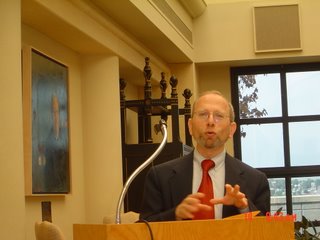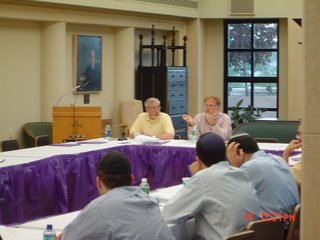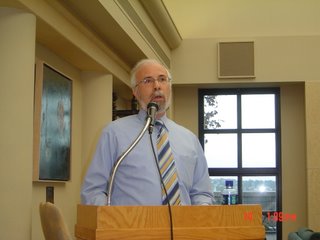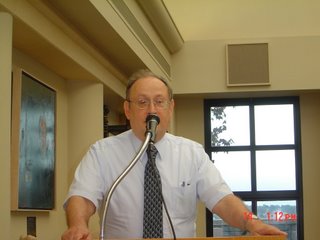 (This posting is the first of my postings today on the conference on Modern Orthodoxy: 1940-1970 Judaic Studies program of the University of Scranton, co-sponsored by Edah. Yesterday's postings: first, second, and third.)
(This posting is the first of my postings today on the conference on Modern Orthodoxy: 1940-1970 Judaic Studies program of the University of Scranton, co-sponsored by Edah. Yesterday's postings: first, second, and third.)The first lecture today was given by Prof. Jonathan Sarna on "The Break Between Conservative and Orthodox in America." It was followed up by a brief response by Prof. Marc Shapiro and one by Prof. Benjamin Brown (if you know of a link for him, let me know). An interesting quote was where he mentioned YCT in passing during the discussion following his speech:
What interests me is when do you have institutions that shape a different movement and when not. Thus, for example, will we one day say because you have Chovevei Torah and Yeshiva University, they will have to increasingly distinguish themselves from one another and we will look back and say institutions created two different religious movements and Orthodoxy split? I don't know. In other words, when does it happen and when does it not happen? I am not sure that the difference between the Seminary and YU, in its early days, was seen as different than between Chovevei Torah and Yeshiva University. And it remains to be seen what the implications are. I think that it's one of these rules where sometimes it happens and sometimes it doesn't happen. And therefore, we have to figure out why....The next set of talks were entitled
 "Religious Zionism in America: The Creation of an Education System," the first of which was given by Rabbi Yehudah Mirsky on "The New Heavens in the New World: The Religious Hebraism of Samuel K. Mirsky" (who was his grandfather). A quote towards the end of his speech which I found interesting was
"Religious Zionism in America: The Creation of an Education System," the first of which was given by Rabbi Yehudah Mirsky on "The New Heavens in the New World: The Religious Hebraism of Samuel K. Mirsky" (who was his grandfather). A quote towards the end of his speech which I found interesting wasFor some while I've been thinking that maybe the comparatively static category of Modern Orthodoxy might better be re-thought as what I sometimes refer to as modernizing Orthodoxy - a range of ideological and social groupings arrayed around or clustering around certain shared beliefs and practices.The second speech was given by Moshe Sokolow on "The Educational Philosophy of Hirschenson and Religious Zionism." During the discussion following the speech, Kurt Anders Richardson (a Christian theologian who spoke before I arrived yesterday and who provides some interesting insights into various points), made an interesting point regarding religious practice in America:
American religious vitality keeps demonstrating itself through various forms of mediated experience. And probably most supremely, the Paulline claim that if you walk by the spirit of God, you will fulfill the law of God, is very, very important for the American experience. What's interesting is that traditionalism of any kind cannot gain traction because there has never been an operative tradition - juridical or ritual - of American religious experience.The third, and final of the morning, was given by Rabbi Alan Yuter on "The Halakhic Approach of Rabbi Emmanuel Rackman." Unfortunately,
 as you can tell from the audio file, he was not feeling well, so his session was bumped up from being scheduled tomorrow. One thing that was neat about his presentation was that he quoted his son, which slightly surprised me, but was certainly appropriate. One quote that jumped out at me was
as you can tell from the audio file, he was not feeling well, so his session was bumped up from being scheduled tomorrow. One thing that was neat about his presentation was that he quoted his son, which slightly surprised me, but was certainly appropriate. One quote that jumped out at me wasHe (Rackman) asks rhetorically, "How can the rabbis justify their arrogance?" Now, when I hear that kind of idiom, I'm reminded that type of idiom is often used in the Jewish Observer in their critique of people who inhabit those realms of Orthodoxy that are to the left of themselves. It's a retort with whom Rackman is sparring. Consequently, he's the first Modern Orthodox rabbi that I have found to refer to the right-wing Orthodox approach not as 'fervently Orthodox,' - because that means those to the left are not fervent - but as heretics, apikorsim - you got the Torah wrong.... Their heresy - his word, not mine - is that they regard their own Biblical and Talmudic interpretations as canonized in the same measure as the texts themselves, which was never true.Following the above lectures, we broke for lunch.
One thing that struck me about the style of discussion upon a paper (in addition to the first) was that it seemed very much like a blog - someone puts something out there which isn't that dynamic but puts some ideas out on the table, then people jump in and a discussion ensues. I now
 understand what Menachem meant when he typed that it would "be a lot of fun." However, once I started pondering it, I started realizing the numerous vast differences between the two forums of dialogue and discourse. The first is that there is a cap on the length of discussion due to time constraints, whereas the discussion on the Internet can continue and continue (although after some time, only some people actually stay around and keep discussing). A second is that at a conference, people can see each other, get an idea of their personalities, and recognize their humanity versus not seeing people, not interacting directly, and the worst of all, people can be anonymous and subject people to attacks. A third (there are probably more, but I will stop for now) is that at a conference, there are people who are some of the most advanced in their fields and are tremendously knowledgeable, whereas anybody can speak up on a topic on the Internet. However, the last point actually can be positive in that there is a greater amount of accessibility for the masses to the information rather than attending a conference. Nevertheless, a conference is certainly neat for the sharing of ideas, information, as well as cross-pollination of ideas (although this is mainly where there is a more diverse crowd), etc.
understand what Menachem meant when he typed that it would "be a lot of fun." However, once I started pondering it, I started realizing the numerous vast differences between the two forums of dialogue and discourse. The first is that there is a cap on the length of discussion due to time constraints, whereas the discussion on the Internet can continue and continue (although after some time, only some people actually stay around and keep discussing). A second is that at a conference, people can see each other, get an idea of their personalities, and recognize their humanity versus not seeing people, not interacting directly, and the worst of all, people can be anonymous and subject people to attacks. A third (there are probably more, but I will stop for now) is that at a conference, there are people who are some of the most advanced in their fields and are tremendously knowledgeable, whereas anybody can speak up on a topic on the Internet. However, the last point actually can be positive in that there is a greater amount of accessibility for the masses to the information rather than attending a conference. Nevertheless, a conference is certainly neat for the sharing of ideas, information, as well as cross-pollination of ideas (although this is mainly where there is a more diverse crowd), etc.---------------------------
Tags: Edah, University of Scranton, Modern Orthodoxy, Modern Orthodoxy Conference, historiography, Judaism, history, Orthodox Judaism, Conservative Judaism, American Modern Orthodoxy, Rabbi Samuel Mirsky, Samuel Mirsky, Rabbi Hayyim Hirschenson, Hayyim Hirschenson, Religious Zionism, Rabbi Emmanuel Rackman, Emmanuel Rackman, YCT, Yeshivat Chovevei Torah, YU, Yeshiva University, JTS
2 comments:
the first sentence of this post should read "fourth" post.
I meant what I typed. But good looking out, anyways. (It was the first post regarding Wednesday's activities.)
Post a Comment